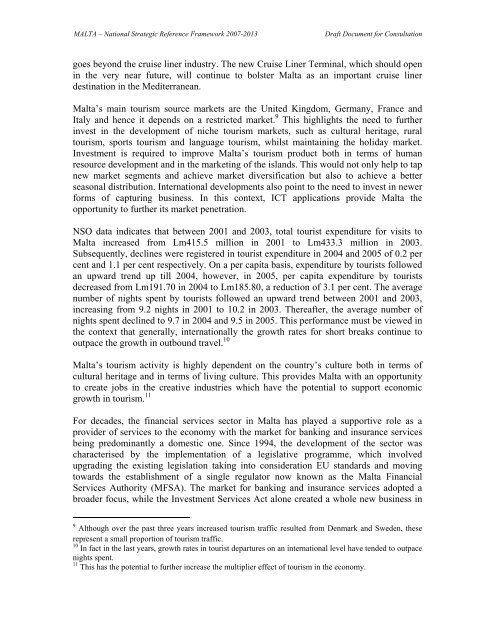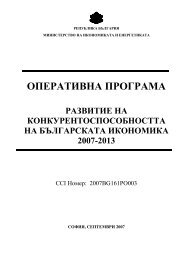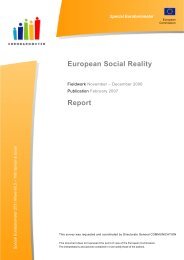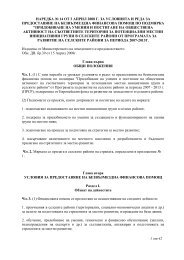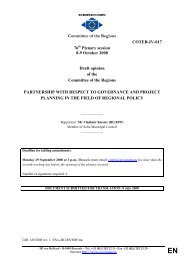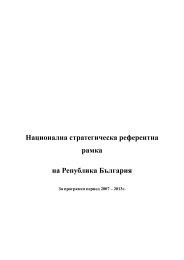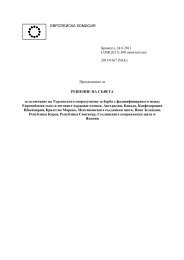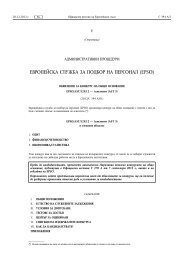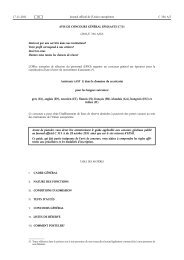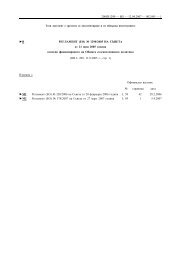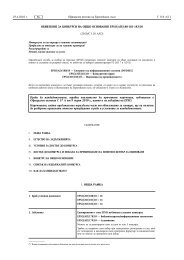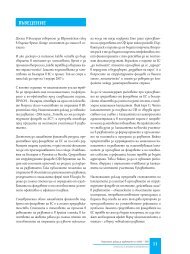National Strategic Reference Framework
National Strategic Reference Framework
National Strategic Reference Framework
Create successful ePaper yourself
Turn your PDF publications into a flip-book with our unique Google optimized e-Paper software.
MALTA – <strong>National</strong> <strong>Strategic</strong> <strong>Reference</strong> <strong>Framework</strong> 2007-2013 Draft Document for Consultation<br />
goes beyond the cruise liner industry. The new Cruise Liner Terminal, which should open<br />
in the very near future, will continue to bolster Malta as an important cruise liner<br />
destination in the Mediterranean.<br />
Malta’s main tourism source markets are the United Kingdom, Germany, France and<br />
Italy and hence it depends on a restricted market. 9 This highlights the need to further<br />
invest in the development of niche tourism markets, such as cultural heritage, rural<br />
tourism, sports tourism and language tourism, whilst maintaining the holiday market.<br />
Investment is required to improve Malta’s tourism product both in terms of human<br />
resource development and in the marketing of the islands. This would not only help to tap<br />
new market segments and achieve market diversification but also to achieve a better<br />
seasonal distribution. International developments also point to the need to invest in newer<br />
forms of capturing business. In this context, ICT applications provide Malta the<br />
opportunity to further its market penetration.<br />
NSO data indicates that between 2001 and 2003, total tourist expenditure for visits to<br />
Malta increased from Lm415.5 million in 2001 to Lm433.3 million in 2003.<br />
Subsequently, declines were registered in tourist expenditure in 2004 and 2005 of 0.2 per<br />
cent and 1.1 per cent respectively. On a per capita basis, expenditure by tourists followed<br />
an upward trend up till 2004, however, in 2005, per capita expenditure by tourists<br />
decreased from Lm191.70 in 2004 to Lm185.80, a reduction of 3.1 per cent. The average<br />
number of nights spent by tourists followed an upward trend between 2001 and 2003,<br />
increasing from 9.2 nights in 2001 to 10.2 in 2003. Thereafter, the average number of<br />
nights spent declined to 9.7 in 2004 and 9.5 in 2005. This performance must be viewed in<br />
the context that generally, internationally the growth rates for short breaks continue to<br />
outpace the growth in outbound travel. 10<br />
Malta’s tourism activity is highly dependent on the country’s culture both in terms of<br />
cultural heritage and in terms of living culture. This provides Malta with an opportunity<br />
to create jobs in the creative industries which have the potential to support economic<br />
growth in tourism. 11<br />
For decades, the financial services sector in Malta has played a supportive role as a<br />
provider of services to the economy with the market for banking and insurance services<br />
being predominantly a domestic one. Since 1994, the development of the sector was<br />
characterised by the implementation of a legislative programme, which involved<br />
upgrading the existing legislation taking into consideration EU standards and moving<br />
towards the establishment of a single regulator now known as the Malta Financial<br />
Services Authority (MFSA). The market for banking and insurance services adopted a<br />
broader focus, while the Investment Services Act alone created a whole new business in<br />
9<br />
Although over the past three years increased tourism traffic resulted from Denmark and Sweden, these<br />
represent a small proportion of tourism traffic.<br />
10<br />
In fact in the last years, growth rates in tourist departures on an international level have tended to outpace<br />
nights spent.<br />
11<br />
This has the potential to further increase the multiplier effect of tourism in the economy.


